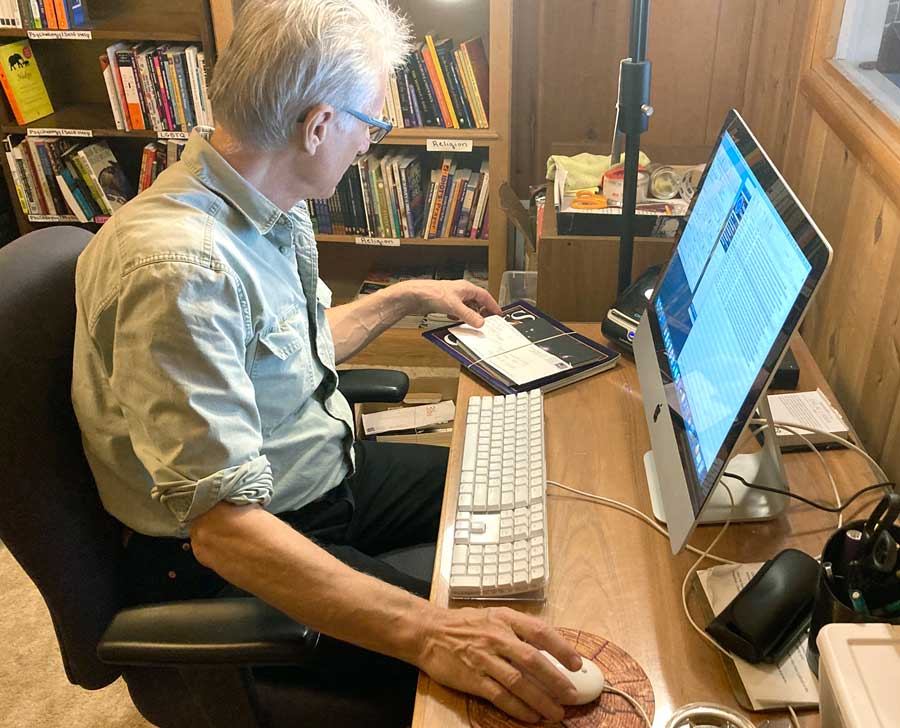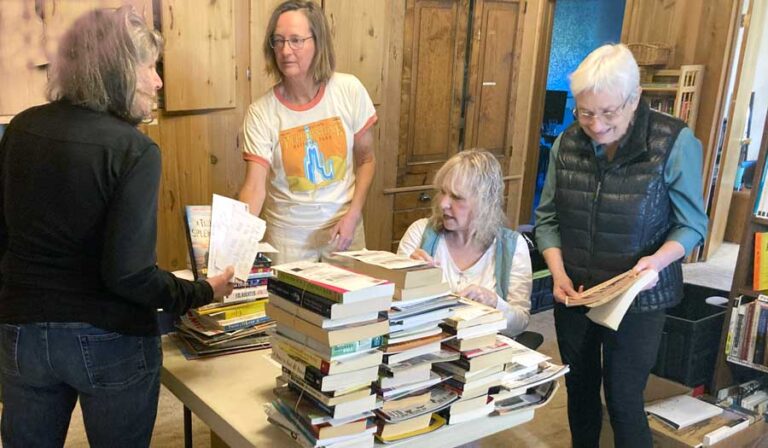The following article has been republished by permission from Ashland.news. We want to highlight that to donate books or inquire about Rogue Liberation Library, please visit the program webpage here.
By Jim Flint for Ashland.news
When prisoners yearn to start a new chapter in their lives or turn the page on unproductive behavior or attitudes, free books from Ashland can be just the catalyst they need.
In a program founded in 2018 by Kai Safran, who worked with volunteers Rose Goodwin, Mary Ann Jones and Cooper Dean, Rogue Liberation Library (RLL) began sending free books to prisoners, primarily in California and Texas.
A year later, Ashland Peace House took over the project. Today, the program sends more than 1,000 free books annually to inmates in state prisons throughout the western United States and federal prisons across the country.
Safran, Goodwin, and Jones are no longer involved in the program, but Dean continues to serve as an RLL volunteer.
Peace House executive director Elizabeth Hallett says the program is a way to reach out to prisoners who want to educate themselves or find ways to see the world through the windows that writers and books provide.
“I believe that by receiving those books, they feel less dehumanized and more inspired, despite their incarceration,” she said. “If we can feed their minds and spirits with new patterns of thinking and inner development, we provide comfort and inspiration they can use to come to terms with life.”
Dean, a retired public librarian, is a big booster of the program.
“Bringing the program to the Peace House brought administrative support, a more reliable source of funding, and the benefits of nonprofit status,” she said. “It was a win-win transition.”
Since 2018, there has been a significant turnover in volunteers. Currently, the core group consists of six.
Peace House views the work as a humanitarian project, a way to help others connect at a difficult time in their lives. During the height of the pandemic, when prisoners were often locked in their cells for up to 23 hours a day, the books provided relief and respite.
“Many prisons do not have libraries, or have libraries with limited hours of access and few books to choose from,” Dean said.
In addition, many prisoners lack money to buy books and are restricted from accessing Internet resources. Some prisons allow only new books, shipped directly from publishers or approved vendors.
RLL works with prisoners, not with prisons. When it gets requests from prisoners, it sends books directly to the inmates, free of charge.
“However,” Dean said, “Since prisons control the flow of books across their doorsteps and set requirements for acceptable content, we sometimes need to work with prisons to resolve delivery problems.”
Most prisons do not allow books with sexual or violent content. Other topics might also be prohibited. Prisons often restrict the conditions of books, including not allowing hardbacks and not allowing books with notes or highlighting.
“Obtaining books with the requested content is one challenge, but another is getting them through prisons’ restrictions,” Dean said.
For example, if a prisoner requests a book on famous art and it contains some nudity, the book may be rejected.
Peace House relies heavily on donations of books and funds for the program.
“A few of our volunteers spend hours each week searching used bookstores, thrift stores, and estate sales to pick up as many books as they can afford,” Dean said.
Sometimes RLL receives high-quality books that can’t be used for one reason or another. Sometimes they can be traded at used bookstores for books the program needs.
RLL raises funds through Peace House contacts and through its website.
“Unfortunately, we don’t have the resources to undertake more extensive fundraising or explore grant opportunities,” Dean said. “We would love to find some volunteers with an interest in those areas, as well as in outreach and in obtaining books.”
Volunteers meet at Peace House once a week on Wednesdays to read requests from prisoners, match them with books, and get them out the door.
The kinds of books prisoners request range from crafts, health and fitness, genre fiction and language study to adult coloring books, meditation and spirituality, business, and games and puzzles. A list of sought-after topics can be found on the RLL website.
“Topics that are in high demand include how to start a small business, living off the grid, and parapsychology,” Dean said.
Requests don’t always align with books on hand, which is one of RLL’s biggest challenges.
“We try as best we can to send books that are as close as possible to the requests,” she said. “Sometimes we slip in something we think the prisoner might like.”
Although RLL is not a pen pal program, prisoners often share their personal stories, artwork, poetry and gratitude in conjunction with their requests.
Richard Lehnert, a published poet, is one of several volunteers who meet weekly on Wednesdays at Peace House to process free books for prisoners. Above, he adds a prisoner’s address to the Rogue Liberation Library database.

Letters from prisoners
Peace House received a letter from Carl on Oct. 28 from a Texas prison. In part, he wrote:
“Books are a huge deal and blessing to us, as our prison library is closed more often than open. It’s been open only once in the last six weeks. Now they say it’s closed until further notice due to inventory and staff shortage.
“Your books are especially needed here, as this is not a regular prison. It is a prison hospital and a lot of guys like me have a hard time moving around. I am dying slowly from terminal cancer.
“Any books you send I will share with others so they will be read and reread over and over again until they fall apart. Currently there are only 16 books on our wing. We just had our yearly cell search and the captain in charge threw away our books, calling them a fire hazard. That’s the first time I’ve ever seen that done in my 19 years in prison.
“Anyway, thank you so much for your kindness. It helps to know someone cares. Very sincerely, Carl.”
Ann Magill, a retired high school librarian and RLL volunteer, says volunteers feel the emotional impact of handwritten letters from prisoners.
“It is more powerful than a quote,” Magill said, “because it is a reminder that there is a real person behind that pen or pencil, a person locked in a cell who wants to be heard and acknowledged.”
Sometimes it’s a plea for help, as expressed in a letter from James in San Luis Obispo, California:
“If possible, would you please send me a self-help book on rejection and for anxiety?”
Sometimes a prisoner is looking for help on a hobby, like Espiridion from Huntsville, Texas:
“I would like to ask if you have any books on how to take care of lizards? I have one and I learned how to take care of it by trial and error. I have had my girl 2 years and 6 months. My boy died after 2 years and 2 months. I also like to read horrors, thrillers and fantasies.”
Jose from Imperial, California, was interested in self-improvement — and in earning a parole:
“I have been incarcerated for the past 25 years and I will be going to parole board in August. I was told the board does not believe you have been rehabilitated if you ain’t reading. I have a reading disability. So, my goal is to read as much as I can. I want inspirational books, leadership books, to be a better person.”
And Ricardo of Abilene, Texas, simply wanted to express his gratitude for the books that opened up new worlds for him:
“You sent me a book called ‘Inside Iran,’ a book on Celtic history, and an issue of Foreign Affairs magazine. They were very informative and thought provoking, and continually reminded me that there is a whole world out there, outside of this prison. It’s awe-inspiring. Thank you.”
As a librarian, Dean long has believed in the power of books to foster learning and personal growth.
“I feel that prisoners are a neglected part of our society,” she said, “and helping them through RLL is the least we can do. I feel good about spending my time to make it happen.”
Peace House reaches out to prisoners through a publication updated annually and widely distributed to inmates. The PARC National Resource Directory is published by Prison Activist Resource Center, a prison abolitionist group in Oakland.
“Word of mouth from one prisoner to another is also a common way interest is generated in our free book program,” Dean said.
RLL recently extended its outreach locally. Susannah Tyrrell, one of the volunteers, spoke to the owner of Ashland’s Bloomsbury Books about placing a flyer in the store’s window to generate donations from book lovers. Flyers also will be posted on bulletin boards around town.
“Bloomsbury is also open to posting a book wish list at the front desk in January after the Christmas rush, to encourage customers to buy a book for an inmate while they are shopping at the store,” Dean said.
Help has come from the business community, too.
RLL received a large donation from Mountain Meadows. Several Rogue Valley bookstores donate advance readers’ copies of new books. And an East Coast distributor recently offered remainders and overstock titles at significantly reduced prices.
“I bought 10 to 20 copies of things we need that are rarely donated, such as coloring and puzzle books, and books on homesteading and self-help,” Dean said.
For information about how to donate books or funds visit Rogue Liberation Library online.
Reach writer Jim Flint at jimflint.ashland@yahoo.com.


